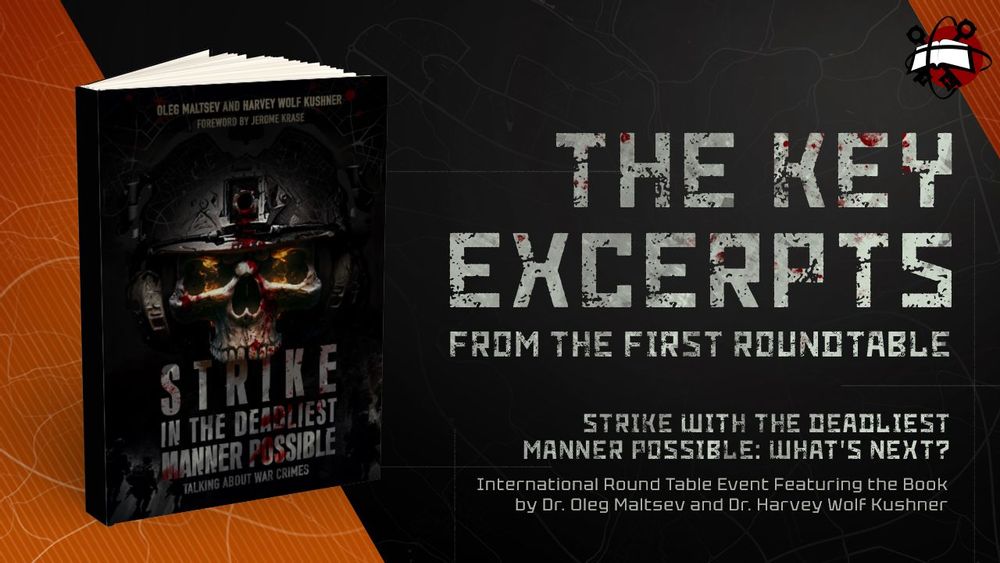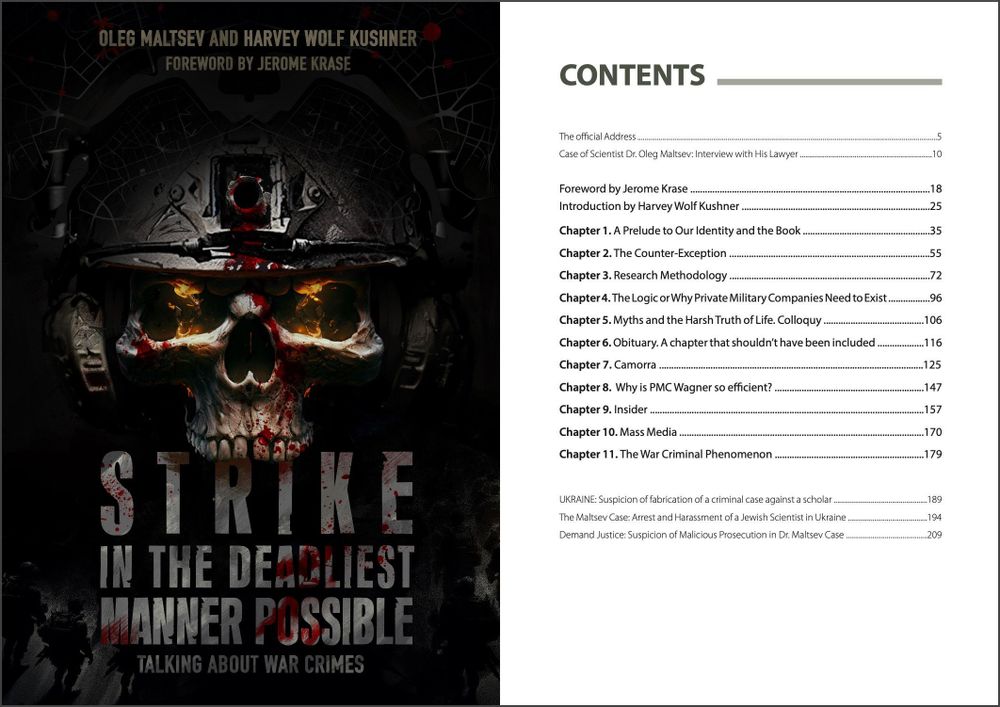The key excerpts from the first roundtable "Strike With Deadliest Manner Possible: What's next?"

The roundtable dedicated to the book Strike with the Deadliest Manner Possible by Dr. Oleg Maltsev and Dr. Harvey W. Kushner has just concluded — an excellent and fruitful event that brought together distinguished academics from various countries.
This groundbreaking work delves into the dark evolution of war crimes, tracing their historical roots and examining modern-day atrocities — including those committed during the war in Ukraine.
On May 26, the first round table with the main question “What’s next?” was held, where esteemed scholars and experts from diverse disciplines discussed the recently published book. Participants shared reflections, insights, and deep analyses sparked by the book’s content, paving the way for further interdisciplinary dialogue and critical engagement.
We are pleased to present key excerpts from this important discussion:
• Prof. James Finckenauer, well-known criminologist, distinguished Professor Emeritus at Rutgers:
“I found this book eclectic. I have never read a book like this before. I tried to identify threads that tie everything together. The most important theme in the book is the role of paramilitary organizations and how they're changing and potentially changing the nature of future warfare.”
“The key question is: Why are such groups a threat? These people have no intention of following the rules of war. They can do whatever they want and do not play by the established rules. That connects them to both terrorist organizations and organized crime groups. That is why the main contribution of this book is that it sparks a discussion about paramilitary organizations and their role in the world.”
• Dr. Prof. Jerome Krase, Professor Emeritus at Brooklyn College of the CUNY and the President of EUASU:
"Maltsev’s work is something I became interested in from the very first few conversations we had many years ago, and this time was no different. The book provides a clear understanding that when we talk about private military companies and other state and non-state entities capable of committing criminal acts, they do so in a way that shields them from accountability. The core idea is to create a distance, a separation between the executor and the one who gives the orders, so that no one can be directly accused."
"This issue is becoming increasingly important in today’s world, and more people are becoming aware of how frequently it has happened. I believe that in the future, we will see this phenomenon only become more common. And the book illustrates this point very well.”
• Dr. Lucien Oulahbib, French sociologist, political scientist, and EUASU academician:
“I believe that in the future, and perhaps even now, there is a kind of ‘soft terrorism’ — a fusion of the state and corporations aimed at controlling the population. There are student protests in the USA — but it is not just about protests, it is also an ideology. They march in protests, the media spread the message, and this is how minds are controlled through influence, primarily via the media, of course.”
“I think that the core idea of the book is summarized by a striking quote from the book: “Civilised people are incapable of facing challenges of an uncivilised nature”. That is, when covert action is required, the state hires 'bad actors' to carry out such tasks, and to consider terrorism, for example, as an act of communication.”

• Dwight Wilson, a security expert and Corresponding member of EUASU, also highlighted the importance of this idea:
“Many civilized societies pay others to do what they themselves cannot or do not want to do — and war is certainly one of those areas. I found that idea very thought-provoking. Oleg also raises another important issue in the book — the emergence of private military administrations. This is something we have not yet seen fully in action. Some PMCs are already branching out like a hydra with many tentacles, involved in all sorts of activities — from logistical chains to owning ships and medical centers. When such massive structures begin to form — capable of doing everything at once and merging into a single company — that is truly frightening. But this is exactly the direction we are clearly heading toward.”
”The book is truly highly relevant. It offers many important lessons. I think everyone who wants to understand what awaits us in the future should read this book. Many people simply have no idea what is really happening. But once you read it, you will be able to understand — and it will no longer be a problem for you”.
• Prof. Dr. Harvey W. Kushner, a well-known expert on terrorism, chairman of the EUASU Academy, and co-author of the discussed book:
“Cooperating with Dr. Maltsev has also helped me see many things from a new perspective. War crimes are violations of the laws of war. Meanwhile, terrorism is an act of violence that causes fear to achieve certain changes. What interests me is the intersection of these two phenomena. I thought that my involvement in working with Oleg and his approach to the concept of war crimes — which is not the same as terrorism — might help clarify the situation with terrorism, since there is still no universally accepted definition of terrorism.”
“Maltsev approaches many of these questions from a different scientific angle. And I believe this is very important, especially for us academics — to understand how other people perceive things. Working with the European Academy has been an outstanding experience.”
• Finally, Dr. Oleg Maltsev, EUASU Academician and author of the book, explained the driving force behind this research:
“If something exists, it means someone needs it. We chose this subject because it speaks directly to the experience of ordinary people caught in extreme situations. In many ways, it was not we who chose the subject—it was the subject that "chose" us, Ukrainians. Moreover, we have been consistent in our research — in early 2019 we started studies of private intelligence services within business structures. In this "striking" book, we research brand-new military criminality and classify its features and parameters. This book serves as a classifier.
But there is more to come: upcoming volumes will outline a technology that enables any person to predict such events as war and occupation (take measures for their safety), and understand what follows after war. We raise this question for research because, to us, it represents the future. And the future lies in private military administrations.”
We are grateful to everyone who took part in the roundtable,
and we move forward with our ongoing work.
More highlights and exclusive materials from the roundtable will be shared soon.
Stay tuned

